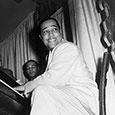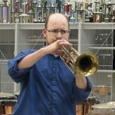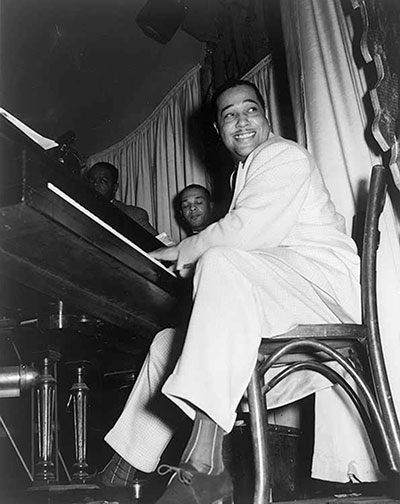
About twenty years ago, I taught at a school where budget constraints made it a big deal to purchase music. Our jazz library was stale, and my students and I were hungry for some new tunes but without the budget to do it. I had heard of a program that Wynton Marsalis and the team at Jazz at Lincoln Center was putting on called Essentially Ellington, but only knew that it was one of the biggest jazz competitions in America. Friends told me the program also offered free music.
These charts are not arrangements but exact transcriptions of the originals, meaning students play the same notes and rhythms as Johnny Hodges, Harry Carney, and the other historic greats who passed through Duke’s bands. The charts range from fairly easy blues heads up to college-level literature, so almost any program can find something to play. Furthermore, when you sign up, you have access to the entire library of past years’ tunes, making it easier to find music featuring any instrument or section, at any difficulty you need. It is impossible to play these charts without feeling like you are a piece of jazz history yourself. Each score comes with pages of information, including teaching tips and original personnel. The fabulous website also has links for the original audio, an updated Lincoln Center Jazz Orchestra version, rehearsal videos, and other resources.
Starting each year in February you can submit your band’s recordings to get some incredible feedback. If your band is really doing well, you can submit it to the competition, and even if you are not one of the 15 bands nationally that get to go to New York, you get pages of comments from the top ears in the game. Any band can submit recordings for comments only, and you can submit as little as one song. These comments are not the scribbles you might get from a local festival; they are thoughtful and specific, with not only things they heard and wanted to hear, but ways for your band to get better. In the first year at my current school, we submitted for the competition, and while we did not make it, we got four pages, typed and single-spaced, of comments that we implemented right away. That year, the extra composer was Benny Goodman, and we submitted one of his tunes. One of the listeners was the last living bass player to play in Benny’s band, so we received comments on Benny’s music from Benny’s bass player. For free, you will get better feedback than you would from any competition or festival.
If you are lucky enough to have a band selected to go to New York for the competition, you and your students are in for a life-changing experience. Although our band has never been selected, I talked to several directors across the country who had. Here is what they had to say.
John Currey
Champaign Central High School (Illinois)
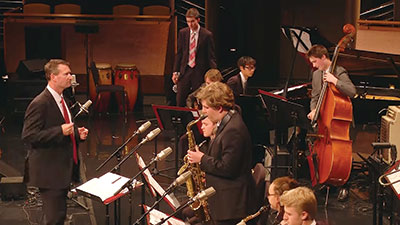
The next year, my boosters paid to send me to the first Band Director Academy. In my first session, Wynton Marsalis stood about 15 feet away from me, and I was awestruck. That trip changed everything about how I ran the band. I used to hope that a lead alto or trumpet player would move in when I didn’t have one. I realized that it was up to me to develop those players and put those sounds in the heads of my students. The next year our band just missed receiving an invitation to compete, but I attended the Band Director Academy with my middle school director, and this experience fueled our program for the next few years.
The Weekend in New York
Nothing beats going to Lincoln Center and seeing so many great student groups. Usually at a jazz festival there might be one or two impressive bands, but there every band is amazing. The cheer tunnel makes you feel like a million bucks right from the start. Every single person in the Jazz at Lincoln Center band is there to help students. They are so positive and generous with their time. I know it is a competition, but I have never thought of it that way. You win just by going.
Building Our Program
When I arrived at Champaign Central, the program had a history of great jazz bands from the 1960s through the 1980s but was in a rebuilding mode. Early on, I spent a fair amount of our budget on music. Finding music for our younger and less experienced kids was key to our students’ development and building confidence. Good arrangements and extensive listening to recordings was essential. I try to have students listen to many recordings of the tunes in their folder so they can learn the concepts and fundamentals of a good jazz sound. Reading and listening is a big part of our approach. Even in my third band, we typically play 50-80 charts in a year; I don’t concentrate on three or four tunes and call it a day. I think the kids should learn skills and concepts that allow them to apply what they know from one chart to another. Besides, I would get bored easily playing the same few charts over and over.
I also emphasize student articulations, asking players to sing the music the way we want it to sound. Periodic sectionals allow us to clarify that sound we are seeking. The more detailed you get, the better.
In college, I was a classical saxophone player who also played in a jazz band. I have never been a great improviser and have attended clinics and brought in excellent guest artists to help me with my deficiencies. More than anything, I have been a good facilitator, getting students set up with good private teachers and the right mouthpieces and equipment. Starting combos at our school helped with the last piece of the puzzle; it has helped with what we needed to improve. Concentrating on improvisation with the combos took our groups to another level.
Noblesville High School (Indiana)
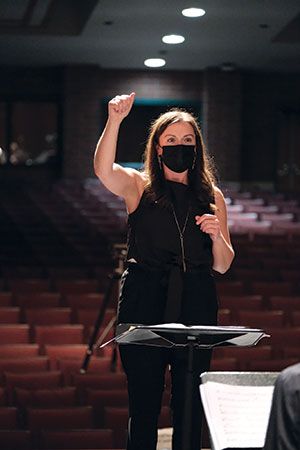
I found information online about the Band Director Academy scheduled for July of 2011, and I used part of the grant to attend. It changed my life to learn from teachers like Reggie Thomas, Terrell Stafford, and Ron Carter. I had never thought about incorporating a lot of singing or dancing into my rehearsals, and I had never heard of Essentially Ellington.
One night I started talking to other directors who were the veterans in the room. It was cool to be in that culture and start uncovering this whole world of jazz that I didn’t know. When I returned home I started implementing some of the ideas I learned into my classroom. We began dancing every day to Count Basie just to get class started. I then had enough students for two bands, and the following year, we opened a freshman campus so I could justify a third, freshman-only band. The program kept growing.
Eventually we went back to having grades 9-12 in one building, and we have five jazz bands that meet during the school day. About five years ago, we started recording for the Ellington competition. After five years of attending band director academy, I finally felt my students were ready to attempt Duke Ellington music. Although we were nowhere close to earning an invitation, we applied and received great feedback from the comments. We kept trying and learning with the help of some great jazz professors and professionals who came in to work with our kids. We finally made the festival in 2021.
The Application Process
The band started recording from the beginning using a zoom recorder and continued the entire way. As the application date approached, I sent new recordings out to students every day. Those daily recordings were invaluable. When you play, you think the music sounds one way, but the recording gives a much clearer picture. I regularly send recordings even to my younger students who are not working on Duke Ellington music. Kids love listening to themselves. They are so invested in the music and want to play it for their family. It is a good motivator to have a recording device that easily uploads to your computer and sends out files to your students weekly.
Playing During a Pandemic
We spent considerable time in our auditorium spread six feet apart. We could only meet before school because our kids were all on a hybrid schedule, with half of the band present for each half of the week. The lead players never played with the rhythm section, and the second and third players never played with the lead players or rhythm section. It was pretty crazy but also motivating because students really wanted to come in before school so that they could meet as a full band to get to know each other and build the band that way. Meeting outside of school regularly really paid off when we made the Essentially Ellington Festival for the very first time, and one of the many highlights of that virtual experience was a one-hour rehearsal with saxophonist Sherman Irby from the Jazz at Lincoln Center Orchestra. He gave us such great feedback.
The organizers really tried to make the virtual festival as exciting and connected as possible. We had a Q&A session with Wynton Marsalis one evening about social justice and a piece he had written after the death of George Floyd. That was meaningful for our students because they had witnessed that piece of history and needed to process it. There were moments like that that really affected the students’ lives.
During the festival performances, there was an hour break between the two sets of the festival, and we invited our entire community to our auditorium to hear us perform. Our mayor came and declared it Noblesville Jazz Day. We made it as close to a festival atmosphere as possible.
Finding a Higher Level
In 2011, when I discovered the program, I realized the high caliber of the bands invited to Essentially Ellington. Even though we were nowhere near that level at the time, I decided we needed to start somewhere. Simply incorporating some of the Ellington charts was a first step. Listening to the original recordings and trying to work on some of the more accessible charts was a good beginning. A few years later, I started submitting the recordings for feedback. The recording process was such a great learning experience for students, and the feedback sent by the festival offers great ideas to guide you to the next level.
There is nothing to lose from working on incredible music, gaining recording experience, and receiving incredible comments from adjudicators. The process becomes more comfortable each year as students and directors grow and learn more about the music.
Beloit Memorial High School
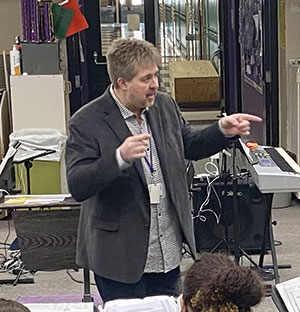
I discovered that Ellington’s music is the real thing. It is so diverse. He wrote for some amazing players. When you put those parts in front of your kids, they are playing music written for some of the greatest jazz musicians in the world. I realized that if you give students the resources, recordings, and a little bit of faith and motivation, they will learn this music. The sound of Ellington’s music is so inspiring and motivational. It keeps calling you back.
Recording
Our recording process begins as early as we can possibly set up microphones. By listening to your playing as early as possible, you start making it better. Every time we record, we sit down the next day and make a list of things to improve. This approach is sometimes repeated multiple times a week. That is how you get to the level that we have been fortunate to reach several times.
The Months After the Invitation
After receiving the invitation, our performance changes to a whole other level of scrutiny. I rely on students who have been there before to help younger students understand that up on that stage, you have 17 minutes and one shot to play your best and have fun. You want to improve from the recording and also try to make the music say something unique and personal.
In New York
The experience is unlike anything I’ve ever experienced musically. It is amazing to be in a room of students and educators who appreciate that music at such a high level. It is a competition, but there is so much love, everybody wants you perform well and you feel that support and appreciation. Being around those directors and students from around the country led to making friends I talk to all the time. Students also make life-long connections. They return fired up and ready to continue playing.
Advice
The Essentially Ellington program has provided a wealth of great literature and resources for my ensembles. There are charts for all levels, but don’t be afraid to modify the range or instrumentation with younger groups. The important point is programming authentic swing music from some of the greatest composers this music has to offer. This leads to discussions of the history, the musicians in the band, and of course listening to the original recordings.
Listening is such a key factor in playing this music. I tell my students that you need to have a hero to listen to, someone who inspires you to practice and has a sound you want to imitate. I encourage them to make a playlist on their favorite streaming service and listen to one artist for a few months. Listen for ideas to transcribe and imitate. Assimilating someone’s style is a great way to start your journey into learning this music.
Mount Si High School Snoqualmie, WA
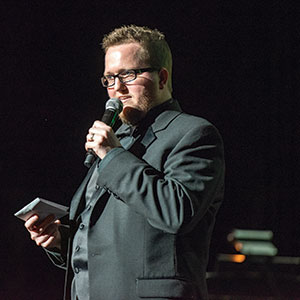
Recordings
Our recording process begins with a conversation with the ensemble. Whenever applying to an important event like this, the entire band must be on board and invested. It takes sacrifice and dedication. This means not just learning the charts but really studying the recordings and having extra sectionals. I try to instill in students that regardless of the outcome, it is so important to approach the opportunity with gratitude. We have no control over what happens after we submit our recording. We put everything we have in it with no regrets. At the end, we feel good about how we honored the music.
Before New York
The clinicians sent out to work with us by Essentially Ellington provide a chance to take the music to an even higher level. There is always more that you can draw out from a tune. An important element is finding tunes that fit the band and drawing out those extra layers in the music.
I involve students in music selection more and more. Sometimes we disagree, but it is important to hear their thoughts. Players bring up ideas about how to play a certain phrase or solo section that never would have occurred to me.
The Weekend
The experience is world-class from beginning to end. The community of musicians from different bands is so supportive. Performing for that energized crowd and seeing Wynton in the audience listening is hard to describe. Our community is small and really supports us. The local movie theater in North Bend, livestreams the festival for the community to hear.
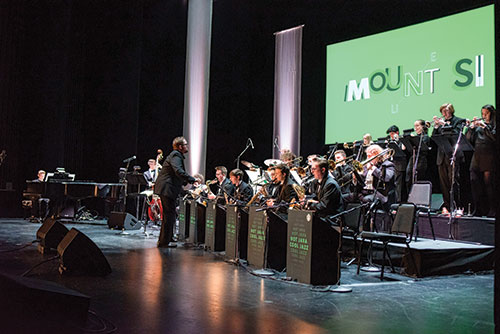
Advice
I believe in singing just as much as we play. Even if it is a struggle at first, incorporating singing into every rehearsal will help any band achieve a greater sense of time, unity of articulation, style, and so much more. If you can’t sing it, you can’t play it.
Next, I love to work with my band on coordination with their singing. Especially in the early part of the year, we sing pages of Ted Reed’s drumming book Syncopation while moving our heels on the quarter note, and patting hands on our legs on 2 and 4. This trains students to independently feel syncopated swing rhythms and drastically improves their time.
Lastly, I think it is important to learn something by ear daily, even if it is just a simple scale patterns that can be transposed into a few keys, or even all twelve. This engages the ears in every rehearsal. This works especially well when applied to a set of changes for tunes being worked on for performance.
